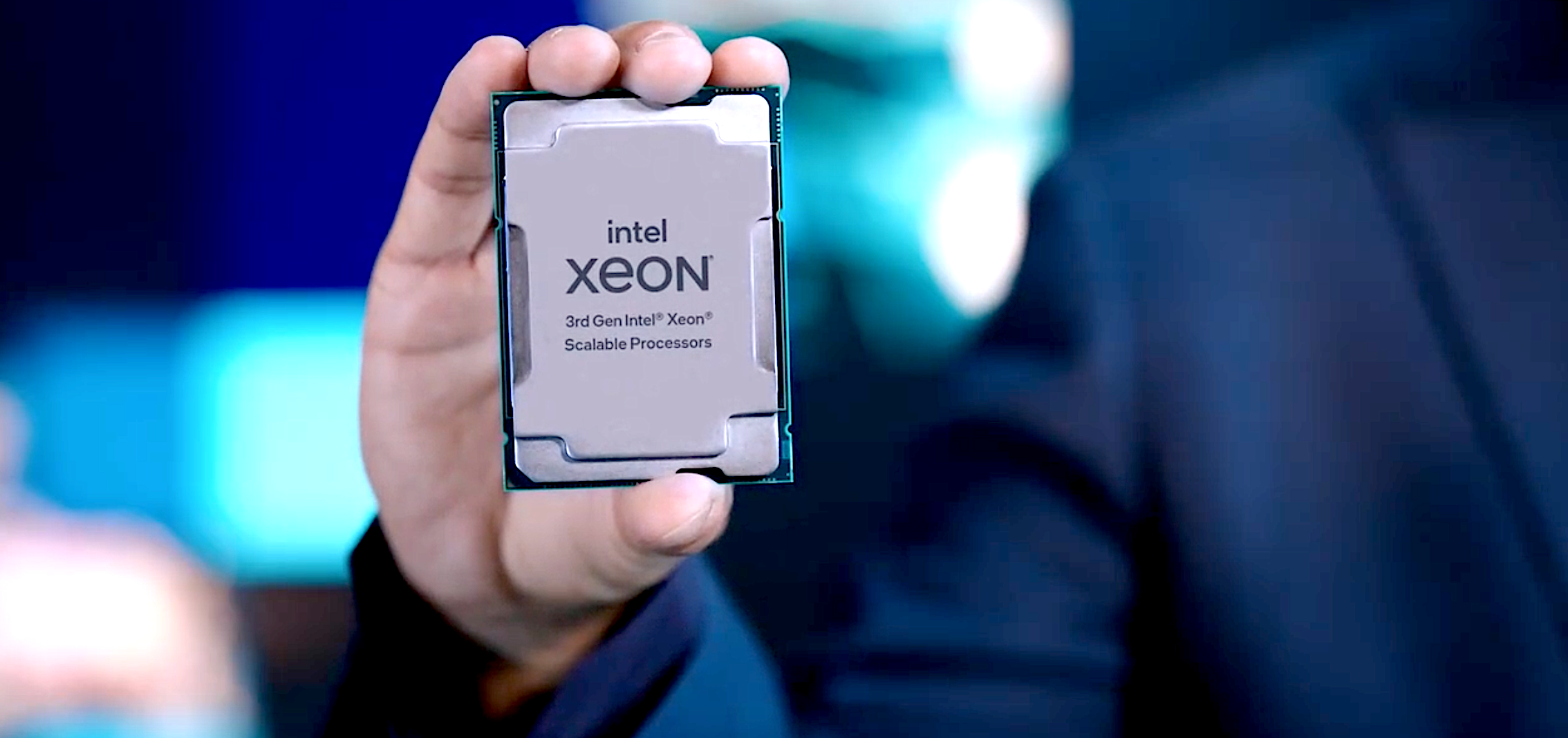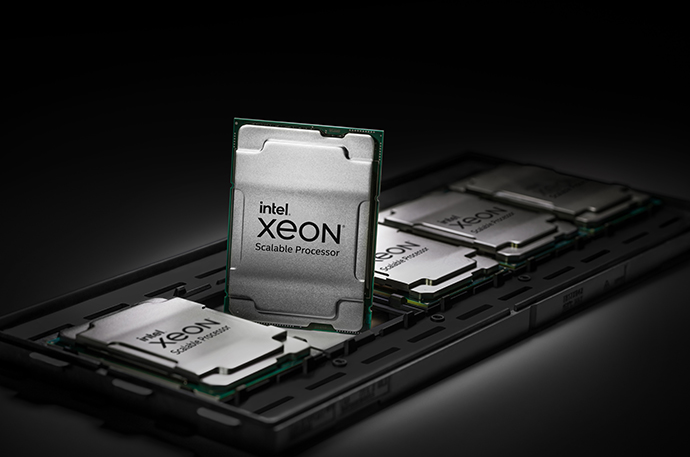 INFRA
INFRA
 INFRA
INFRA
 INFRA
INFRA
Intel Corp. today refreshed its flagship Xeon server processor line with more than three dozen new chips based on its latest 10-nanometer manufacturing process and featuring a raft of specialized features, including a high-speed artificial intelligence accelerator.
The new chips, which are launching under the code name Ice Lake, represent the biggest update to Intel’s server portfolio in recent memory. They will power an upcoming generation of compute instances in the major public clouds, new supercomputers and high-speed 5G infrastructure, among many other systems.
“The data centers of the future will look very different from the way they do today,” Navin Shenoy, executive vice president and general manager of Intel’s Data Platforms Group, said during an online launch event today. “Intel now builds every component of what enterprises need.”
Intel says the Ice Lake series, which Shenoy called “the greatest processor we’ve ever built,” provides a 20% improvement in the number of instructions that can be carried out per clock cycle, a key measure of chip performance. That’s mainly thanks to the series’ use of a new core design known as Sunny Lake. Intel has packaged no fewer than 40 of those Sunny Lakes cores into the fastest Ice Lake central processing unit, the Xeon Platinum 8380, which can support 80 threads at a base frequency of 2.3 gigahertz.
Intel says customers should expect an average 46% speedup in “popular data center workloads” compared with its previous-generation server CPUs. Compared with a five-year-old server, machines powered by Ice Lake will perform computations 260% faster.
The 20% boost in instructions per clock cycle is only one of the contributors to Ice Lake’s performance. Intel’s chip designers have also increased the size of the onboard caches, the memory circuits in which CPUs store the data they currently process. The more memory circuits there are, the more data can be processed at once. The Sunny Cove cores that power the Ice Lake series have a 50% bigger L1 cache, the technical term for a CPU’s main memory bank, than previous-generation Xeon chips and a 25% bigger L2 secondary cache.
While at it, Intel enhanced the speed at which its CPUs can fetch data from random-access memory. In a notable improvement over previous-generation Xeon chips, all Ice Lake processors are shipping with eight memory channels. That means more data can be transferred to and from RAM at once.
The top-end Xeon Platinum 8380 also pulls information significantly faster from other types of peripheral hardware, such as graphics cards, networking devices and flash storage, thanks to support for the new PCIe 4.0 hardware interconnect technology. PCIe 4.0 is twice as fast as the previous PCIe 3.0 standard.
“With a backdrop of fierce competition, Intel is leading with its strengths with its 3rd Gen Xeon processors,” commented Patrick Moorhead, president and principal analyst at Moor Insights & Strategy. “The company is offering a platform approach to provide its partners solutions incorporating CPUs, storage, memory, FPGAs and networking ASICs. This is in addition to its ability to leverage resources for co-marketing and co-development.”

Another element of Intel’s pitch to partners such as server makers is a set of specialized processing features shipping with Ice Lake. They mainly focus on boosting cybersecurity and artificial intelligence applications, which process data using a different set of mathematical operations than standard workloads.
In the cybersecurity department, the flagship Xeon Platinum 8380 and other top-end Ice Lake chips ship with a memory isolation technology called SGX. It allows the CPU to turn parts of a server’s RAM into “secure enclaves” that lend themselves to storing sensitive data such as encryption keys. Data in secure enclaves is inaccessible to other applications running on the same server, even if they otherwise have full administrator-level access to the machine.
Common encryption algorithms such as AES, SHA and GFNI run faster on Ice Lake silicon thanks to a series of complex software algorithms built into the chips. Part of the speedup is the result of Intel having parallelized some encryption operations so that they can be run side-by-side rather than one after another. In one instance, the company’s engineers found a way to compress two separate algorithms into a single workflow to reduce processing requirements.
For applications that use AI models, Ice Lake provides an implementation of Intel’s DL Boost machine learning accelerator. The accelerator is one of the main highlights of the processor series. Intel is promising 74% faster AI performance than previous-generation chips and up to 150% faster speeds than rival Advanced Micro Devices Inc.’s EPYC 7763 CPU. The chipmaker reached the latter figure by comparing the two processors across what it describes as 20 popular AI workloads.
According to Moorhead, Intel is “differentiated with its on-chip ML inference and cryptographic capabilities versus its closest competitors.”
Though Ice Lake officially only launched today, Intel has already sold more than 200,000 units to early customers. Those chips were purchased by leading cloud service providers, which Intel says are already working on new Ice Lake-powered instances, high-performance computing labs and server makers. Telecommunications equipment makers have lined up to purchase Ice Lake chips as well, in part because the chip series features multiple carrier-focused processors specifically optimized to power 5G infrastructure.
With reporting from Robert Hof
Support our open free content by sharing and engaging with our content and community.
Where Technology Leaders Connect, Share Intelligence & Create Opportunities
SiliconANGLE Media is a recognized leader in digital media innovation serving innovative audiences and brands, bringing together cutting-edge technology, influential content, strategic insights and real-time audience engagement. As the parent company of SiliconANGLE, theCUBE Network, theCUBE Research, CUBE365, theCUBE AI and theCUBE SuperStudios — such as those established in Silicon Valley and the New York Stock Exchange (NYSE) — SiliconANGLE Media operates at the intersection of media, technology, and AI. .
Founded by tech visionaries John Furrier and Dave Vellante, SiliconANGLE Media has built a powerful ecosystem of industry-leading digital media brands, with a reach of 15+ million elite tech professionals. The company’s new, proprietary theCUBE AI Video cloud is breaking ground in audience interaction, leveraging theCUBEai.com neural network to help technology companies make data-driven decisions and stay at the forefront of industry conversations.